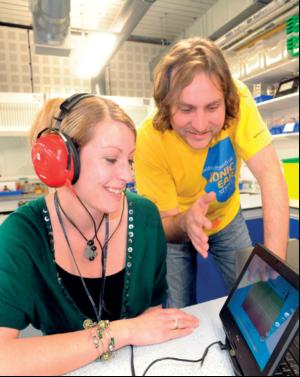Andrew Goodwin explains why hearing screenings are so important for
businesses with a duty of care to employees, and why Deafness Research
UK has never been busier in providing this essential service
Andrew Goodwin explains why hearing screenings are so important for
businesses with a duty of care to employees, and why Deafness Research
UK has never been busier in providing this essential service
When I tell people that I travel
around the country
conducting hearing
screenings for national charity Deafness
Research UK and trying to prevent
noise-induced hearing loss (NIHL) in
the workplace, I usually have some
explaining to do.
What surprises me is how noise at work
is thought of as a historical problem.
People have this image in their minds of
deafening 19th century factories,
somewhere in the north of England at
the height of the industrial revolution.
Yet the fact is NIHL is still very much
with us, which is why hearing screenings
with the Bionic Ear Show from Deafness
Research UK continue to prove so
important.
Another surprise for many is when I
explain that The Control of Noise at
Work Regulations only passed into law
eight years ago as part of the Health and
Safety at Work Act. These additional
regulations were needed to combat NIHL
in the workplace and the corresponding
rise in the number of claims for
disablement benefit in connection with it.
The charity's own statistics, coupled with
figures from the Office for National
Statistics (ONS) all demonstrate that our
efforts to combat the causes of hearing
loss through education are more relevant
than ever.
As recently as 2011, some 150 new
claims for NIHL disablement benefit
were assessed and a study by the Labour
Force Survey on behalf of the ONS shows
that in the last couple of years the
average number of cases of NIHL caused
or made worse by noise in the workplace
stood at 19,000 - a staggering and quite
alarming figure for a supposedly low
priority or 'historical' problem.
The Control of Noise at Work
Regulations demand that all staff working
in an environment with an average noise
level of over 85db must be given hearing
protection. It is also the responsibility of
the employer to continually check and
make sure that staff are wearing the
hearing protection provided and offer
regular hearing checks - and this is where
Deafness Research UK comes in. The
industries with the largest number of new
cases are manufacturing, construction
and extraction, energy and water supply.
But the feedback we have received is that
we really do have a lot of success in
getting the health messages across.
Our own figures from hearing
screening visits to businesses across the
UK are telling. At least 20% of staff we
have screened needed to be referred to a
GP for a more in-depth hearing test
and/or other medical treatment. On
some occasions, this number has been as
high as 45%.
Ear health education
Part of our role is to advise not only on
the importance of wearing good ear
protection, but to educate staff on general
ear health too. So we cover why ear
protection is important (and what
happens to your hearing if you ignore it),
while explaining why you should never
use cotton buds and the importance of
keeping the ears clear of dirt and grease.
In a factory we visited last year, ear
infections were rife, whilst at the same
time reports of hearing loss were falling.
The employer was very responsible and
insisted staff were trained and were
wearing the appropriate hearing
protection. However, the correct way to
use ear plugs was not covered, as it was
assumed to be obvious. In this particular
factory, many jobs involved a lot of dirt
and grease and people were not cleaning
their hands before putting in the ear
plugs, so while their ears were protected
from noise, ear hygiene was poor.
A quick masterclass was all it took for
staff to be better informed about the need
for and types of hearing protection and
correct hygiene procedures before using
them. For some, ear mufflers became a
better option, while for others, safe,
hygienic ways of using ear plugs were all
that was required (like getting a fresh pair
each time you enter the factory, rather than
using the same dirty pair you have kept for
months in your pocket) to deliver a happier
and now infection-free workforce.
This year we have visited more
workplaces than ever to get the hearing
health message across. Whether you want
to opt for our full, interactive Bionic Ear
Show presentation, or hearing screenings
alone, it is completely free - and an
effortless way for those charged with
making decisions on health and safety to
demonstrate they take their duty of care
in this regard seriously.
Andrew Goodwin is outreach advisor
for Deafness Research UK
For further information visit the Deafness
Research UK team at Health & Safety
South on Stand 24


